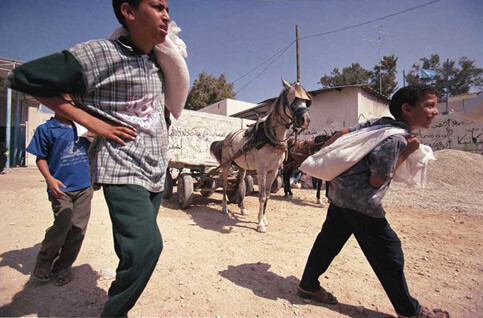Euro-Mediterranean Human Rights Network 21 October 2005

The restrictions on freedom of movement hamper Palestinians’ possibilities to work for an improvement of the economy. (Ronald de Hommel)
On 5-8 October the Euro-Mediterranean Human Rights Network sent a delegation to visit the Gaza Strip to document the human rights situation in relation to the Israeli “Disengagement Plan”.
The mission team concluded that following evacuation of the illegal Israeli settlements Gazans are now able to move within the Gaza Strip and have access the 40 percent land previously occupied by Israel. However the mission team also concludes that: the Israeli occupation of the Gaza Strip remains, and Palestinians’ right to freedom of movement is under Israeli control. The restrictions on freedom of movement hamper Palestinians’ possibilities to work for an improvement of the economy. Unemployment rates are high and the investment environment highly risky, the restrictions on movement separate families that live on different sides of borders. Chances for them to meet depend on Israel’s willingness and is thus totally out of their control. The work of civil society is made more difficult as organisations and individuals cannot move freely to do their work. Work relations are highly dependant on non-physical means of communication.
“Palestinian civilians remain in desperate need of the implementation of international law - an end to the siege imposed on the OPT, the accelerated construction of illegal settlements and of this illegal wall”, says Raji Sourani, Director of the Palestinian Centre for Human Rights.
“The mere redeployment of the Israeli troops from Gaza does not mean that the economic and social situation in Gaza stops deteriorating”, adds Issam Younis, General Director, Al Mezan Centre for Human Rights.
In December 2003 Israeli Prime Minister Sharon announced a “Disengagement Plan” for the Gaza Strip, and some areas of the West Bank. By 22 August this year, in the course of the plan, all the 21 illegal Israeli settlements were evacuated from the Gaza Strip, and the Israeli military redeployed to the borders of the Strip. Since September, all borders (air, sea and land) of the Gaza Strip have been closed, with only minor, temporary lifting.
Neither people, nor goods can enter or exit the Gaza Strip. As an key element of the Israeli “Disengagement Plan”, Palestinians are not in control of the land and not of access to and from the Gaza Strip.
The delegation, hosted by Palestinian Centre for Human Rights, consisted of Stefan August Luetgenau (Bruno Kreisky Foundation, Austria), Per Stadig (lawyer, Sweden), and Marita Roos (EMHRN Coordinator, Denmark). The delegation met with representatives from Gazan civil society, business community, religious groups as well as from the Palestinian National Authority.
In the margins of this mission, the delegation also met with civil society organisations in the West Bank and Israel. A full report from the mission will be published shortly. This mission was co-sponsored by ICCO, the Netherlands.
More Information
Related Links